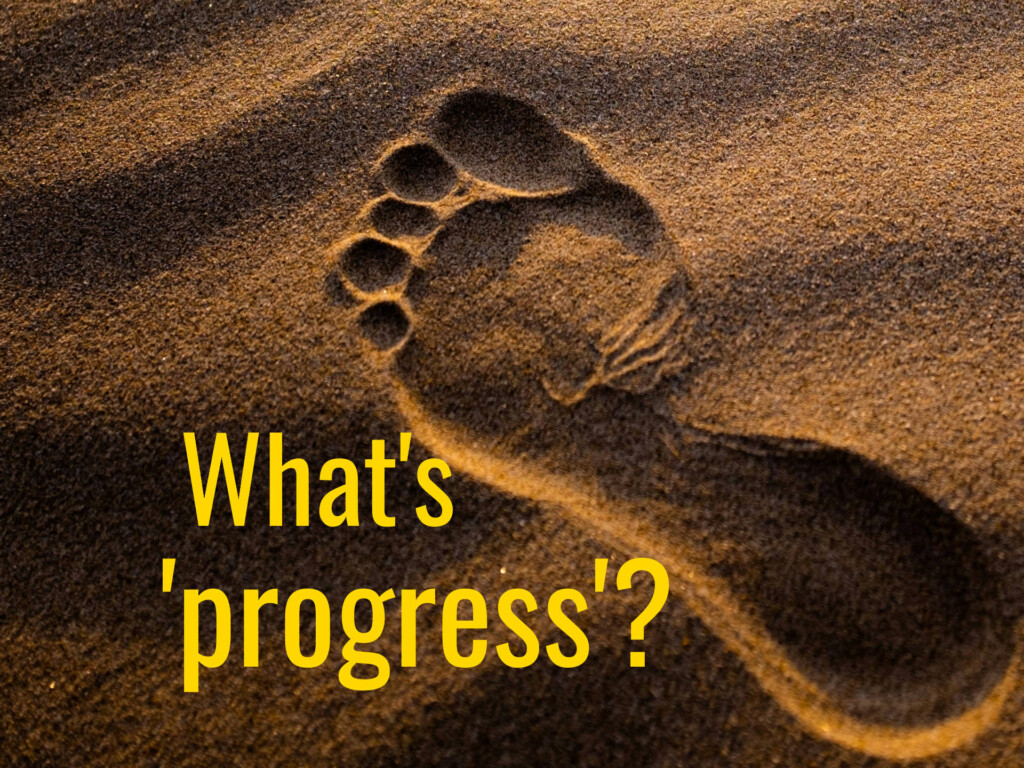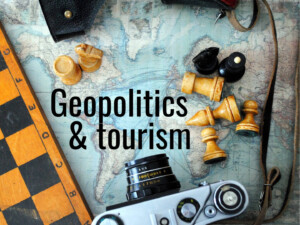“GT” Insight Bites: What constitutes ‘progress’ for travel & tourism in 2024?

In 2024, what constitutes ‘progress’ for the travel & tourism industry where you work, or that you have identified through your observations, study, or research?
It’s a “Good Tourism” Insight Bites question.
Your correspondent put the question to the travel & tourism stakeholders in the “GT” network, inviting responses of no more than 300 words.
Thanks to the 18 respondents — professors, professionals, practitioners — who took the time to share their thoughts on the question. Their answers appear in the order received.
Thanks also to Ronda J Green for her BiteX about Australia and Indonesia celebrating geotourism and Herb Hiller for his BiteX about saving the Okefenokee Swamp in the USA.
Bites menu
- ‘Deep progress’
- Ed’s note: A change to the question
- The foundation of progress is freedom of speech
- Discussions, not slamming doors
- ‘Memorable, safe, and sustainable experiences’
- Don’t take progress for granted
- ‘Progress for one may well be a drawback for another’
- ‘The world needs strong mindsets now more than ever’
- More sustainable approaches
- Consensus on what’s progress is ‘becoming harder than ever’
- I am, you are, we are ‘the masses’
- A more sustainable Singapore
- More people travelling closer to home
- ‘Change course NOW’
- ‘Reducing our impact on our natural resources’
- Sincere, collaborative sustainability
- Progress on several fronts in Rwanda
- Decency, dignity, value, compassion
- Balancing sustainability, community, and culture in Musanze, Rwanda
- Progress for tourism and the environment in Western Australia
- “GT” Insight BiteX (‘X’ is up to you)
- BiteX: Australia, Indonesia celebrate geotourism
- BiteX: Saving Okefenokee
- What do you think?
- Featured image (top of post)
- Previous “GT” Insight Bites
‘Deep progress’
K Michael Haywood, publisher, ‘Destinations-in-Action’, Canada
Travelling for pleasure represents a freedom of movement that has progressed from deep roots to become an enshrined right that has bettered humanity for centuries.
Nowadays there is much skepticism and distrust, due in large part to difficulties associated with reconfiguring our mobility eco-systems, and managing tourism’s exponential growth.
If, however, our desire is to make tourism human and make it right, is it necessary to dwell on recriminations and social regressions?
Wouldn’t we be better off if, instead, we argued for a new philosophy and psychology of progress and truly understood the answers to the question: “What is Progress?”
Progress that would:
- Redefine and clarify tourism’s essential role in delivering compelling and meaningful customer and destination outcomes?
- Posit the essential requirements for agency and action in regard to helping resolve society’s high-priority urgencies (e.g. climate change, as in Amsterdam)?
Agency and action that would require leaders and managers (representing varied vested interests) to collaborate more effectively, gracefully playing the long game as they move forward, while avoiding the illusion of progress.
Everyone committed to making their sense of purpose real; generating positive and principled impacts; actively protecting our collective rights to mobility and hospitality.
Progress requiring entire hosting communities and their guests to be inspired by progressive ideas that will help us:
- Renew tourism’s role in improving our collective health and ‘wellth’;
- Evolve and move from the why to the how of scale, scope, and diversity;
- Architect and design the right depth and quality of capabilities;
- Create better operating models;
- Renew insights continuously;
- Measure returns and outcomes; and,
- Reallocate investments.
Everyone persevering to re-learn how to succeed in an era of volatility; in many cases, leveraging history and culture to push our communities-as-destinations forward.
Trying harder to embellish an already wonderful world!
Ed’s note: A change to the question
Michael Haywood, above, responded to the much shorter original question:
What constitutes ‘progress’ for the travel & tourism industry?
Prof Haywood was the only respondent after several days. That gave me pause. Perhaps the short question was too big — or too dangerous — to answer, especially in only 300 words. So I extended the deadline and tweaked the question to:
In 2024, what constitutes ‘progress’ for the travel & tourism industry where you work, or that you have identified through your observations, study, or research?
And I offered the brief backstory to why I asked it, as follows:
“A few people unsubscribed from the “GT” newsletter recently because I featured Jim Butcher’s reflections upon an interview with Dimitrios Buhalis.
“Professor Buhalis reckons ‘overtourism’ is not a thing; that the word ‘overtourism’ rather scapegoats a whole industry for failures in destination planning and management; and that there are billions of people on Earth who dream of travelling but have yet to do so.
“Perhaps the few who unsubscribed from the newsletter failed to — or didn’t want to — understand the nuance in Prof Buhalis’ opinion.
“One unsubscriber cited Buhalis’ “privilege as a white male” as a reason why his opinion was “problematic”. Given that choice of words, it would not be a shock to me if that person were to identify, politically, as ‘progressive’ … (but maybe I’m guilty of stereotyping!) …”
Having offered that background, the responses below may (or may not) be influenced by it. (Normally, “GT” Insight Bite questions are left to respondents’ individual interpretations.)
In an email announcing a second deadline extension, I answered my own question … as an example of how one might answer. That follows immediately; disrupting the chronological order for the sake of this segue …
The foundation of progress is freedom of speech
David Gillbanks, Publisher, ‘The “Good Tourism” Blog’, Australia
Why is it hard, these days, to communicate one’s own sense of what constitutes progress? Is it because someone might not like it?

For me it’s easy to tell you what constitutes ‘progress’.
I’ve put years of sweat and savings into creating a unique publishing platform for diverse opinions about all things travel & tourism.
Thus ‘progress’ for me in 2024 is breaking even, earning a (modest) living from “GT”, and rolling out more opportunities for people to freely express their opinions about our industry.
My personal sense of progress is based on my circumstances, love for travel, observations of increasing ideopolitical polarisation, and worries about a creeping culture of censorship in many areas, including academia.
Regarding my latter concern, the concept of free expression applies universally, so one would think it friendly to the ‘progressive’ ideas coming out of universities.
It is certainly friendly to ‘diversity’. “GT’s” growing list of guest authors from all over the world, and with many different backgrounds, is testament to that. Yet there are no ‘diversity quotas’ hanging over my head threatening to chop it off if that were not the case.
I believe I’m reasonable, like most people: Open to different ideas and willing to treat with respect anyone who would in good faith share their thoughts with me even, nay, especially if I disagree with them.
But tolerance and acceptance have their limits.
Reasonable people should oppose ideologies and ‘authorities’ of any stripe that would shut down heterodox opinions by force or coercion. And we should be deeply suspicious of those who would engage in passive-aggressive argumentum ad hominem or algorithmic trickery.
Throughout history, challenges to received wisdom have led to progress across many dimensions: sociopolitical, scientific, environmental …
Censorship is tyranny, plain and simple, not progress. Let’s not be confused about that.
Discussions, not slamming doors
Frédéric Dimanche, Director, Ted Rogers School of Hospitality and Tourism Management, Toronto Metropolitan University, Canada
Progress would be having people engage in a discussion rather than slamming the door closed when they don’t like to hear something …
‘Memorable, safe, and sustainable experiences’
Aini Wikamto, Managing Director, Khiri Travel Indonesia
In 2024, progress in the travel & tourism industry is marked by several key advancements.

Firstly, sustainability initiatives have become paramount, with a focus on reducing carbon footprints and supporting local communities.
Secondly, technology plays a crucial role, offering seamless booking experiences and immersive virtual tours.
Thirdly, personalisation is on the rise as companies leverage data analytics to tailor travel experiences to individual preferences.
Additionally, safety measures have been enhanced to address global health concerns, ensuring travellers feel secure.
Cultural diversity is also celebrated, with a greater emphasis on promoting inclusivity and showcasing diverse traditions.
Lastly, infrastructure development remains crucial for accommodating evolving traveller needs, with investments in transportation and accommodations.
Overall, progress in the industry is about creating memorable, safe, and sustainable experiences for travellers worldwide.
[Khiri Travel is a valued “Good Tourism” Partner.]
Don’t take progress for granted
Steve Noakes, Chair, Binna Burra Lodge, Australia; Founder, Pacific Asia Tourism
What does ‘progress’ really mean?
In 1915, as the ‘great and cruel’ war raged in Europe, dragging in colonial networks around the world, Victor S Yarros wrote an article published in the American Journal of Sociology titled ‘Human Progress: The Idea and the Reality’. He wrote:
“[T]he essence of the modern conception of progress is continuity — relative, perhaps, rather than absolute, but continuity — steadiness, persistence, and certainty.”
He continued:
“The conception implies that progress is in a sense the law of humanity; that human beings […] are better now than they were in the past, and will be better tomorrow than they are today.”
There’s lots more to think about from Yarros’ article written over 100 years ago discussing this concept of ‘progress’. If it’s a topic of any interest, it makes good reading while you’re waiting at an airport or on a train/boat ride.
So what can it tell us about the ‘here and now’ and the global travel and tourism industry?
As the global travel shutdown during the COVID-19 pandemic reminded us, progress is not automatic. In 1915, Yarros wrote:
“[P]rogress must be planned and worked for, not taken for granted.”
Oh, and back at my local tourism operator level, progress in 2024 will be starting the construction of a new Binna Burra Lodge five years after the Australian ‘Black Summer’ bushfire devastation!
‘Progress for one may well be a drawback for another’
Robin Boustead, Founder, Great Himalaya Trail, Nepal
Overtourism is a condition that many destinations would love to suffer from. One would rather decide how to reduce demand than strive to increase it.

‘Progress’ for one may well be a drawback for another. This is especially true in tourism where electricity poles spoil views and modern homes ruin idyllic villages.
However, such considerations are largely redundant when we think about the constraints in which we operate. There simply aren’t enough flight corridors to take us to an infinite number of places. The same is true for location carrying capacity.
It’s time to stop using subjective value judgments like ‘progress’ and to start focusing on the realities of tourism impacts; how to make them positive for everyone.
Yes, there is a global north ‘entitlement’ to tourism with expectations of hot showers, WiFi, and picture-postcard views. Much of the global south wants something like that too.
It has started. For example, domestic tourism in India is now so strong that international arrivals are a low priority for most destinations. The same is true in China.
As global affluence increases, the number of ‘entitled travellers’ is likely to rapidly increase, unless they learn to think and behave differently.
Buhalis is correct to say the responsibility for overtourism is shared by destinations. The pushback from cities like Amsterdam and Venice is an attempt to address the misconception that they exist for holidays rather than homes.
But the tourism sector as a whole is guilty of trampling over lives in the name of fun.
Overtourism is a ‘thing’ just as progress is a ‘thing’. Both can be forces for good if we are prepared to challenge our own cognitive constraints, place the interest of others before our own, and accept that some of the best ideas originate in ‘problematic’ discussion.
‘The world needs strong mindsets now more than ever’
Saverio F Bertolucci, Commercial Assistant, VDB Luxury Properties, Spain
‘Progress’ is a synonym for ‘constructive mindset’.
For individuals, the term has historically entailed a pragmatic analysis of ones’ objectives and goals along a path towards a bright future.
The same word assumes different connotations in tourism depending on the specific sector but is usually linked with sustainable and regenerative development policies that make people, the economy, and the environment better off.
Overall, progress implies that individuals can create a positive future for themselves and others through the enhancement of their skills and abilities to effect positive change.
However, I am alarmed by a trend I have noticed in Western academia, which doesn’t bode well for the future. Professors are warping notions of progress to create cultural division and discrimination based on skin colour, sex, and other immutable characteristics.
For example, commenting on one of my posts on LinkedIn, Freya Higgins-Desbiolles, an ‘Adjunct’ of the University of South Australia, made a point of noting that the interviewees for the Tourism’s Horizon Interviews were “only older white men […] many with oldstyle [sic] views”. (I have the screen capture.)
By pointing out their age, race, and sex — without any reference at all to their arguments — she not only tries to dismiss their opinions, but also the validity of their professional backgrounds, experiences, and contributions to tourism.
This newfangled bigotry is not uncommon. Higgins-Desbiolles is not alone.
This is my message to anyone who may be attracted by such attitudes: Life is tough. Don’t blame anybody for your inability to achieve your goals. Work on yourself and keep going. The world needs strong mindsets now more than ever.
More sustainable approaches
Richard A Shepard, Trustee & CEO, Sustainable Rural Development International, UK
Overall, I think progress, based on recent studies and news reports, is characterised by a shift towards more meaningful, sustainable, inclusive, and transformative travel experiences that cater to evolving consumer preferences and values.
For example, in our Black Sea Sustainable Tourism (BSST) program we track growing trends and even recommend looking at a broader, holistic picture of where tourism should be going.
We have written about nature-based solutions at Sustainable Rural Development International (SRDI) that can have a positive impact on tourism. The reception has also been positive.
Beyond that, progress from our perspective is the growth in interest in travel that includes meaningful and immersive experiences.
Travellers appear to be more discerning about green practices and are demanding transparency in sustainability claims, driving the industry towards more responsible and eco-conscious practices.
Additionally, evidence suggests that the industry is increasingly prioritising sustainability, with a focus on local gastronomy, nature, wellness, and rural tourism experiences that benefit the destination community.
Relatedly, travel experiences that give back to local communities are gaining traction, emphasising the importance of responsible tourism and positive social impact.
This trend highlights a move towards more ethical and community-focused travel practices which includes managing overcrowding and the destruction of the very thing travellers want to enjoy.
Progress is incremental and builds on itself. The trends are there. They just need to be nurtured to gain widespread acceptance until they are the standard, not the exception.
Consensus on what’s progress is ‘becoming harder than ever’
C Michael Hall, Professor, University of Canterbury, New Zealand
Progress tends to be defined in certain ways by different stakeholders.

Often progress has been narrowly defined from an industry perspective with respect to economic returns, staying in business, or visitor numbers, while for others attention to social or environmental priorities may constitute progress.
The difficulty — as always — is to somehow bring these perspectives together in a manner that can satisfy most parties.
I would suggest that, despite the rhetoric of sustainability and regeneration, this prospect is becoming harder than ever given global economic, political, and environmental conditions.
I am, you are, we are ‘the masses’
Vilhelmiina Vainikka, Post-doctoral research fellow, geographer, Tampere University, Finland
For me, as a geographer, ‘progress’ would be to recognise ‘the masses’ in mass tourism as many different classes of people; and count ourselves among them.
We, the masses, connect all forms of tourism, however niche. We require the motivation to voluntarily embark on a trip and the infrastructure to make it possible.
We may travel to learn about other cultures, yet we only need to visit the migrant diasporas in our own cities to achieve that. But we travel abroad in large numbers, which negatively affects host communities.
And so ‘overtourism’ poses the difficult question of who gets to go. Who is the ‘over’ in overtourism? Who is not welcome?
Local voices may say that only small numbers of ‘good’ tourists are welcome; often framed as luxury tourists, or well-educated tourists, or other privileged ‘well-behaved’ people. From a social justice viewpoint, is this fair?
Many people have stopped travelling because they can’t afford to. Many more have never travelled very far from home.
When we talk about ‘inclusion’ in tourism, we must not only think about host populations as economic beneficiaries, but also consider those who have no opportunity to travel.
Tourism is a very challenging topic to discuss because it has so many different perspectives and dimensions.
Our focus today should be on ensuring the ‘good life’ for everyone now and in the future.
But of course our planet has limits.
When we, the masses, travel we should avoid emitting greenhouse gases, contributing to climate change, and accelerating the loss of biodiversity. Is that possible?
So what is a ‘good life’? Does it include travel? Is travel a basic need?
These are deeply ethical and moral questions, not to be taken lightly by anyone; in destinations, industry, or academia. So let’s discuss together.
A more sustainable Singapore
Kevin Phun, Founder & Director, The Centre for Responsible Tourism Singapore
2024 feels like a new chapter for Singapore’s tourism industry, although some might say 2022 was, when Singapore reopened post-COVID.
2022 was also when the Singapore Tourism Board (STB) announced mandatory requirements for the hotel and MICE sectors to undertake sustainability certification by 2030.
Progress this year could be interpreted as more tourism companies coming forward to undertake certification.
For Singapore’s tourism industry, the concept of sustainable tourism is fairly new. Except for multinationals, most tourism businesses here have probably never seen so many sustainability practices, let alone adopted them.
Alas we find ourselves having to quickly learn best practices and phase out unsustainable ones. In a decade’s time, we will see a very different operating environment.
“How high will the bar be?” one might ask.
In Singapore, there is much political will for sustainability. Mandatory certification could be the way we raise standards here. After accommodation and MICE, will we see mandates for the remaining sectors of the tourism industry?
Maybe. That could also be an indicator of progress.
In Southeast Asia more broadly, sustainable tourism is not in its infancy. Singapore’s neighbours started on the journey a decade or more ago. However, regional governments regulate certain things and not others, which makes Singapore look like it has moved quickly.
There are reasons for a lack of regulation. A lack of political will is not really one of them.
Another indicator of progress in Singapore for 2024 will be the number of discussions about sustainable tourism. We have seen few in the past but that could be about to change.
We are making progress. Some of it may not always be visible. In any case, sustainable tourism is a form of progress that’s relatively new to Singaporeans.
[The Centre for Responsible Tourism Singapore is a valued “Good Tourism” Partner.]
More people travelling closer to home
Duncan M Simpson, Writer, Simply Hostels and Light travels, UK
Progress is “forward or onward movement towards a destination; development towards a better … condition”, according to the Oxford English Dictionary.
From my previous work in youth hostels, and from my research in youth travel and social tourism in the period 1919 – 1939, that “destination” and “better condition” for tourism would be more (young) people benefitting from holidays, recreation, and tourism generally.
Reaching that destination looks threatened, unlikely, and even unwanted today. In Britain, the number of people benefiting from tourism over the last 20 years may have declined.
Hostility towards tourism in the media and in communities has not helped. And global warming fears threaten to overwhelm any difficulties. Thus the goal of increasing the number who benefit from tourism is probably less shared today than in the past.
Progress for me means addressing those issues, by travelling less far, using climate-friendly transport, bringing benefits to communities, protecting the environment, and encouraging others to share the goal.
All this happened in the past. We used to holiday closer to home. Research tells me that in the inter-war period (1919 – 1930) there was an increasing focus in Britain on Britons “visiting” and seeing Britain; staying closer to home.
Forms of holiday accommodation like Butlin’s, and holiday villages such as Centre Parcs, used accommodation specifically built and designed for holiday makers who were able to travel sustainably to and within their destinations. Local communities were active in creating youth hostels because they wanted young visitors.
Progress is not usually linear. In the past progress was made. It may have faltered recently but the numbers of young people taking holidays did increase in ways that benefitted participants, communities, and the environment.
Youth hostel history shows that progress can be made. History offers hope.
‘Change course NOW’
Geoffrey Lipman, President & co-founder, SUNx Malta
We are on the metaphorical Titanic, heading for the iceberg of the Code Red, existential climate crisis. And we are rearranging the deckchairs of whether ‘overtourism’ exists or whether it’s just a word?
Give the world a break. Change course NOW.
Peak emissions by 2025 as the IPCC calls for. Halve them by 2030. Real Zero by 2050.
Consign the net stuff to the fishing fleet where it belongs.
Plan for our kids.
[SUNx Malta is a valued “Good Tourism” Partner.]
‘Reducing our impact on our natural resources’
Allan Michaud, Lodge Manager, Cardamom Tented Camp, Cambodia
What constitutes ‘progress’…?

This is a little vague, and I am not exactly an expert in Cambodian tourism, so below is just my opinion, based largely on my experience managing Cardamom Tented Camp.
Cambodian tourism as a whole is still down around 50% from pre-COVID levels. So, in the short term, more of a rebound is urgently required for most people.
In the long term, I feel Cambodia really needs to fully embrace ecotourism or sustainable tourism, which I think many tourists are looking for these days.
My impression of the wider tourism sector is that more needs to be done in this regard. Many places claiming to be ‘sustainable’ or ‘green’ are doing the bare minimum.
Markets make a massive difference to what people want. While we have received people from 85 nations so far, most of our guests are from the UK or Europe, where many people are now looking to reduce their impact on the planet, including during their holidays.
A comment I hear regularly from guests is that we were the only place that seemed genuine in our efforts to be sustainable. While there are other places in Cambodia making an effort, I do think many hoteliers could easily do more.
We don’t spend a lot of extra time or money buying eco-friendly products or to sorting and recycling our waste, so I am not impressed when I hear it suggested that we can do it because we are small. Most of what we do can be replicated anywhere.
Reducing our impact on our natural resources is essential, especially as the global population continues growing and more people look to take holidays yearly.
[Cardamom Tented Camp is a valued “Good Tourism” Partner.]
Sincere, collaborative sustainability
Rob Pearce, General Manager, Anurak Community Lodge, Thailand
There are always a lot of buzzwords flying around, trying to catch the attention of markets. ‘Sustainability’ has been prominent recently.

International brands building large concrete structures on an untouched paradise are ‘sustainable’ … because they say they are! Door entry cards made from wood, rather than from plastic salvaged from the plastic mountain … ‘Sustainable’ is open to interpretation.
During COVID-19 I presented a paper on a sustainable project to an island authority to great applause. The project promised new industries supporting extant businesses, better education, reduced pollution, and, more importantly, the future health of citizens and wildlife.
Unfortunately, it did not take into account the quick profits needed by those who run the authority; who wished to build more polluting properties where there were already too many.
I believe a lot of what travellers look for is the old, rustic feel of a destination. This is fast disappearing under bright lights, behind white walls.
Yet now we are all ‘sustainable’. How ‘sustainable’ do you want to be?
Guest demands have permanently changed. More than a glass container over a plastic one will be needed. Travellers will have greater demands in the future and will need to educate themselves before they vacation.
We build into our guests’ vacations the opportunity to become involved. They may understand more than us on a subject, so we work together to create a genuinely sustainable experience at Anurak and to restore habitats around it.
We learn from each other to constantly reduce our ‘footprints’ but we also need to increase our ‘interaction’ levels at any given opportunity to inject a sense of meaning into someone’s stay. Then, I believe, we can start to make some ‘progress.’
[Anurak Community Lodge is a valued “Good Tourism” Partner.]
Progress on several fronts in Rwanda
Rwaka Mabrise, Communications, Red Rocks Initiative for Sustainable Development & Red Rocks Rwanda
These are several areas in which progress in Rwanda’s travel & tourism industry will be observed in 2024.

Since Rwanda is increasingly emphasising sustainable tourism, particularly in its efforts to protect its rich biodiversity and promote community involvement in tourism activities, progress in this area will include further investments in eco-friendly infrastructure, community-based tourism projects, and conservation efforts aimed at preserving Rwanda’s natural habitats.
As you are aware, Rwanda is well-known for its mountain gorilla trekking experiences in Volcanoes National Park. Efforts to diversify tourism offerings will help attract a broader range of travellers. These include Nyungwe park for other rare primates, Akagera National Park for ‘big 5’ safaris, cultural heritage sites, adventure tourism activities (such as hiking and kayaking), and culinary tourism experiences highlighting Rwandan cuisine.
Efforts also to improve visitor services, including multilingual guides, visitor centres with educational resources, and hospitality training programs for tourism professionals, will contribute to a positive and memorable experience for travellers visiting Rwanda.
Furthermore, as we embrace technological advancements, such as digital platforms for booking accommodations and experiences, mobile apps for navigating tourist attractions, and virtual reality experiences to showcase Rwanda’s offerings, we will streamline tourism operations and enhance the overall visitor experience.
[Red Rocks is a valued “Good Tourism” Partner.]
Decency, dignity, value, compassion
Catherine Germier-Hamel, Impact Entrepreneur, Millennium Destinations, Cambodia
Progress?

For me, it’s about decency and dignity.
For two decades I championed sustainable tourism, once believing it could be the key to ending poverty. Now, seasoned (rather than reasoned) by experience, my vision of the industry is less blurred.
Have I seen progress? Yes, more travel, but for whom? On paper, it’s a universal right, yet billions remain grounded, bearing the burden of tourism’s footprint with little say or fair compensation.
Improved awareness, education, and digitalisation are timebombs in disguise: they create opportunities and expand horizons but also reveal injustice and fuel frustration.
Obsessed with numbers — arrivals, spending, rankings — most of the industry has lost value. And even more during the pandemic.
The “tourists-first” mentality has encouraged exploitation, inequality, and a culture in which hospitality, once sacred, feels like modern slavery. Who wants to work in a system devoid of respect and responsibility? An industry that is lying to itself.
True progress is about (re)gaining value.
Sustainable tourism development, management, and marketing can help attract not only tourists who care, but also talents. But for that, we need a seismic shift, prioritising purpose and redefining success as collective well-being. Positive practices are in place but true progress requires a mindset shift toward empathy, responsibility, and inclusivity.
Progress is about moving from apathy to compassion.
Travel can be a force for good, but not at the expense of others. Travel should be exploration, not exploitation. The seeds of change are within us.
Balancing sustainability, community, and culture in Musanze, Rwanda
Greg Bakunzi, Founder, Red Rocks Initiative for Sustainable Development & Red Rocks Rwanda
In 2024, ‘progress’ for the travel and tourism industry in Musanze, Rwanda, is marked by a balanced approach that prioritises sustainable development, community engagement, and cultural preservation.
We have identified several key indicators of progress:
- Sustainable tourism practices: Progress in the travel & tourism industry involves the adoption of sustainable practices that minimise negative environmental impacts and contribute to the conservation of natural resources. This includes initiatives such as eco-friendly accommodations, responsible wildlife viewing, and carbon offset programmes.
- Community empowerment: Progress is evident in the empowerment of local communities to actively participate in and benefit from tourism activities. This involves initiatives such as community-based tourism enterprises, capacity building, and equitable revenue-sharing mechanisms that ensure local residents are key stakeholders.
- Cultural preservation: Progress in the tourism industry includes efforts to preserve and promote Rwanda’s rich cultural heritage. This entails supporting cultural festivals, heritage sites, and traditional craftsmanship, as well as facilitating cultural exchange programs that allow visitors to engage with local customs and traditions respectfully.
- Diversification of experiences: Progress is reflected in the diversification of tourism experiences beyond iconic attractions such as gorilla trekking. This includes developing niche tourism products such as birdwatching tours, cultural homestays, and adventure activities that appeal to a broader range of travellers who may stay longer.
- Enhanced infrastructure and services: Progress involves investments in infrastructure and services that enhance the overall visitor experience. This includes improvements to transportation networks, hospitality facilities, and visitor information centres
- Measurable impact: Finally, progress is measured by the positive impact of tourism on the local economy, environment, and society. This includes indicators such as job creation, income generation, biodiversity conservation, and cultural revitalisation.
[Red Rocks is a valued “Good Tourism” Partner.]
Progress for tourism and the environment in Western Australia
Erika Jacobson, Founder & CEO, Edgewalkers, Australia
If you identify as an ‘ecotourism’ business, nature and biodiversity are integral to your business model. Your product IS the environment. Without healthy, thriving, biodiverse ecosystems, there’d be NO future for nature-based tourism.
Most tourism to Western Australia (WA) is nature-based. Without nature-based tourism, it’s safe to say that WA’s tourism industry would be radically diminished.
But what if nature-based tourism became an instrumental player in the conservation, protection, and restoration of natural environments? Progress might look like this:
- The WA tourism industry stops pretending that sustainable tourism is possible, despite the federal government’s National Sustainability Framework launched late 2023. Instead, operators identify that protecting, conserving, and restoring the environment is key to survival.
- Operators recognise they are already helping to implement Australia’s 30% by 2030 Strategy for Nature by connecting people to nature, extolling its physical and mental benefits, and giving people immersive experiences in protected natural environments. Therefore, it’s an easy transition to increase and incorporate this role by:
- Partnering with environmental NGOs (e‑NGOs) and participating, promoting, and contributing financially to their activities;
- Creating conservation projects through consultation with e‑NGOs, WA’s Department of Biodiversity, Conservation and Attractions (DBCA), The WA Biodiversity Science Institute, or academic institutions. Examples may include extensive citizen science projects, monitoring and data collection, education, indigenous guide programs, et cetera; and
- Participating in the Nature Repair economy through the purchase and restoration of degraded ecosystems.
- Tourism, environment, and other sectors (education, health) form alliances to advocate for and influence:
- Mandatory use of the nature-based disclosure framework to assess the cost of business to the environment;
- The end of land clearing in southwest WA;
- Classifying the southwest as an Environmentally Sensitive Area (ESA);
- Reassessment of prescribed burning; and
- A proliferation of nature-based wellness and education programs.
“GT” Insight BiteX (‘X’ is up to you)
The “Good Tourism” Blog offers a great opportunity to any travel & tourism stakeholder who wishes to express themself in writing for the benefit of “GT’s” open-minded readers.
To feature in the next “GT” Insight Bite compilation, send no more than 300 words (300 words or fewer (</=300 words)) on any tourism-related idea or concern you may have.
Don’t use AI. if you lack confidence in writing in plain English, “GT’s” publisher will personally help with copy editing. “GT” doesn’t judge. “GT” publishes.
Send your “GT” Insight Bite and picture to [email protected].
BiteX: Australia, Indonesia celebrate geotourism
Ronda J Green, Chair, Wildlife Tourism Australia; Co-owner, Araucaria Ecotours, Australia
Two of the world’s most biodiverse countries, Australia and Indonesia, are combining to celebrate and inspire geotourism this year.
‘Geotourism’ encompasses the underlying geological structure and processes of a region, and how they affect the vegetation, wildlife, and human settlement, from early Indigenous to recent decades.
Being close neighbours, Australia and Indonesia share many features but also display many spectacular differences.
For example, Indonesia has many active volcanoes. Australia has none; but has had many in the past.
Volcanoes past and present have contributed important nutrients to the soil, high peaks to catch clouds rolling in from the ocean, and a variety of topographies and microclimates, allowing colonisation and persistence by a diversity of species of fauna and flora.
Australia and Indonesia mostly harbour very different fauna and flora; think monkeys, elephants, and hornbills versus koalas, platypus, and emus. They also share a few taxonomic groups such as fruit bats, megapodes, and monitor lizards. In turn, plants, animals, and fungi exert their own influence on soils and (especially in the case of trees) microclimates.
A Memorandum between the Australian Geoscience Council (AGC) and the Indonesia Geoparks Network (IGN) in 2023 has led to an Australian – Indonesian collaborative project: The 5th Geotourism Festival & International Conference: “Volcano as a World Class Sustainable Geotourism Destination”.
There will be a series of events:
- Ijen, Indonesia, June 26 – 28
- Lombok, Indonesia, July 4 – 6
- The University of Sydney, Australia, July 18 – 19
- The University of Sydney, Australia, wildlife tourism workshop, July 20
I will lead the wildlife tourism workshop, which is organised by Wildlife Tourism Australia in conjunction with Geofest. We will explore the potential for incorporating wildlife interpretation into geotourism, and consider some species in relation to their dependence (and influence) on particular kinds of soils or landscapes. Join us!
BiteX: Saving Okefenokee
Herb Hiller, Writer & Publisher, The Climate Traveler, USA
We have reached the point where if you can imagine how travel works as climate action it will. Enough actors see how the benefits outweigh anxieties of deprivation.
A challenge I recently joined (without being asked) was to stop plans to mine for minerals in the Okefenokee Swamp in southeast Georgia.
I was quickly accepted by a player who herself became willing to approach others she didn’t know.
Okefenokee is a wilderness of ooze-concealing gators, ghostly moss, and carnivorous wildflowers. It draws 700,000 adventurers a year.
Okefenokee is also a US National Wildlife Refuge and National Heritage Area up for UNESCO World Heritage designation.
Kim Bednarek, who runs nonprofit conservation tours of Okefenokee, co-leads the UNESCO bid.
The mining company promises jobs in a few of Georgia’s poorest counties. But the UNESCO bid shows how nurturing the Okefenokee can extend its global ecotourism economy.
Two rivers flow from the swamp through Florida. One, the Suwannee, runs through borderline Hamilton County, which is among the poorest in Florida.
White Springs on the Suwannee is where, in 1977, I launched the modern day Florida state bicycling movement after a five-decade lapse.
I was writing about another NGO, the Suwannee Bicycle Association (SBA), with which I played no direct role. I approached SBA to get behind the Okefenokee initiative. SBA did.
The Zeist Foundation in Atlanta sponsors a ‘Dream Team’ of under-served teen cyclists who, each spring, ride long distances together. This year’s 30th anniversary tour will bike from Miami Beach up the East Coast Greenway to Maine.
Kim Bednarek’s proposal won the group over to schedule the 2025 tour to loop from Atlanta to the Okefenokee, to White Springs and back.
Acceptable sponsors will want in. We will impact the travel world.
What do you think?
In a comment below share your own thoughts about what constitutes progress for travel & tourism. SIGN IN or REGISTER first. (After signing in you will need to refresh this page to see the comments section.)
Or write a “GT” Insight or “GT” Insight Bite of your own. The “Good Tourism” Blog welcomes diversity of opinion and perspective about travel & tourism, because travel & tourism is everyone’s business.
This is an open invitation to travel & tourism stakeholders from any background to share their thoughts in plain English with a global industry audience.
“GT” doesn’t judge. “GT” publishes. “GT” is where free thought travels.
If you think the tourism media landscape is better with “GT” in it, then please …
Featured image (top of post)
‘What’s ‘progress’? Footprint photo by Jeremy Bishop (CC0) via Unsplash. “GT” added the words.
Previous “GT” Insight Bites
- Considering a career in tourism? Important things you should know in 2024
- What did tourism learn from the COVID-19 pandemic?
- In 2024, what are the best opportunities for tourism over the next five years?
- Tourism’s biggest challenges & threats over the next five years to 2028
- On empowerment, promotion, and the power of expression
- On enrichment, repatriation, the double-edged blade, and war
- On tourism technology, progress, and local benefit-sharing
- Hey, travel & tourism, are you ‘neocolonialist’?
- Who’s the new boss? Asia Pacific tourism industry association seeks leader
- ‘The hospitality industry offers a great career.’ Really?
- Cruise ships: Blessing or blight?
- Tourist vs traveller: What’s the difference?
- The heads of finance, operations, and PR walk into their boss’s office …
- Yes, Tourism Minister
- What are tourism’s biggest challenges & threats over the next five years?
- ‘Tourism is built on the backbone of white supremacy’. What do you think?
- Really, what’s the difference? ‘Sustainable tourism’ vs ‘regenerative tourism’
- Want a career in tourism? Important things you should know
- Diverse perspectives on travel & tourism and a fairer world
- Diverse perspectives on economic degrowth and tourism
- Diverse perspectives on visitor dispersion

















